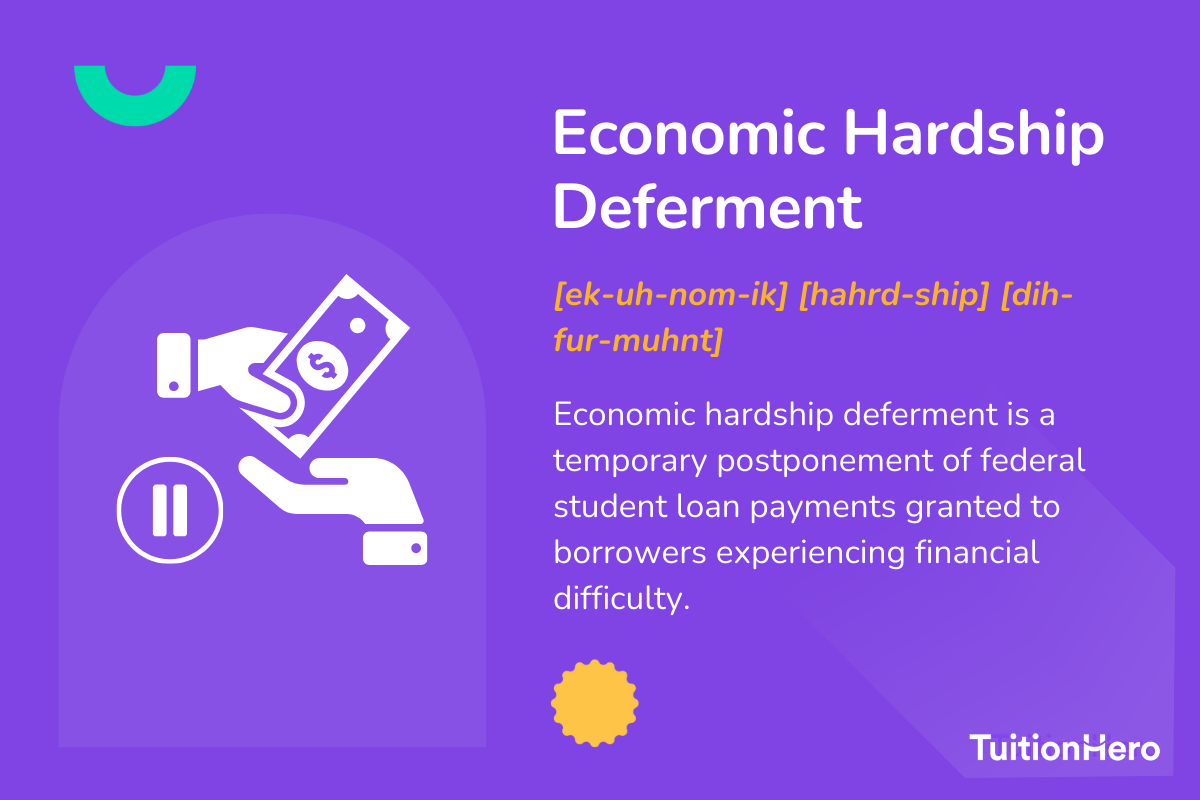Advertiser Disclosure
Last update: November 16, 2024
5 minutes read
What Is Economic Hardship Deferment?
Wondering if you can pause student loans? Learn if economic hardship deferment is right for you and how to apply.

By Derick Rodriguez, Associate Editor
Edited by Brian Flaherty, B.A. Economics
Learn more about our editorial standards



By Derick Rodriguez, Associate Editor
Edited by Brian Flaherty, B.A. Economics
Learn more about our editorial standards
Struggling with federal student loan payments? You might wonder, what is economic hardship deferment and how can it help me? In simple terms, economic hardship deferment allows you to temporarily pause your federal student loan payments if you're finding it tough to pay due to low income. You'll discover eligibility requirements, benefits, and more on how this could give you the financial breathing room you need.

Key takeaways
- Economic hardship deferment pauses federal student loan payments for up to 3 years
- You need to meet income constraints and other criteria to qualify
- Subsidized loans don't accrue interest during deferment, while unsubsidized loans do
What is Economic Hardship Deferment?
Economic Hardship Deferment is a way for people with federal student loans to temporarily stop making payments if they're going through tough financial times, like facing a big drop in income or receiving certain government benefits. This option lets borrowers take a break from paying back their loans for a while.
It's important to know that the rules and requirements can be different depending on the type of federal student loan you have. If you're struggling financially, you can apply for this deferment and talk to your loan servicer for more details and help.

How can you pause your student loan payments?
If you're going through tough times and want to pause your student loan payments with the Economic Hardship Deferment program, here's what you can do:
- Check if you're eligible: Make sure you're facing financial challenges like unemployment or low income.
- Talk to your loan servicer: Reach out to the company handling your federal student loan (you can find this info on your loan statements). Explain your situation and ask about the Economic Hardship Deferment.
- Fill out the form: Your loan servicer will give you forms or an online application. Complete it accurately and provide any needed documents.
- Send in your application: Mail the filled-out form and documents to your loan servicer. Keep a copy for yourself.
- Wait for approval: Your loan servicer will review your application and let you know if it's approved. They'll also tell you how long the deferment lasts.
- Stay updated: While your loans are on pause, stay informed about what's happening. Find out if interest is still adding up, as this can be different based on your loan.
Who qualifies for economic hardship deferment?
Before you go ahead and imagine a payment-free future, check if you tick the boxes for this program. To qualify, you must:
- Have federal student loans.
- Be on means-tested benefits like Temporary Assistance for Needy Families, or serving in the Peace Corps.
- Work full-time and earn less than the minimum wage rate or 150% of the poverty line for your household size and state.
Here are the income caps you'd need to be under to qualify in most states:
- 1-person family: $22,590
- 2-person family: $30,660
- 8-person family: $79,080

TuitionHero Tip
For crowded households, tack on an extra $8,070 for each person beyond the eighth.
What loans are covered by this deferment?
You can apply for this type of deferment for a wide range of federal loans. Eligible loans for deferment include:
- Direct Loans (including subsidized and unsubsidized)
- FFEL Loans
- Federal Perkins Loans
- PLUS Loans (including grad and parent)
But interest is the sneaky part. With some loans, it keeps growing even while you're on deferment—think unsubsidized and PLUS loans. If you've got those, consider whether you can pay the interest to avoid a bigger balance later.
Here's a table breaking it down:
Loan Type | Interest Charges During Deferment? |
|---|---|
Direct Subsidized/Stafford Subsidized | No |
Federal Perkins Loans | No |
Direct Unsubsidized and PLUS Loans | Yes |
Stafford Unsubsidized and FFEL PLUS | Yes |
What if you don't make the economic hardship cut?
Not everyone fits the bill for an economic hardship deferment. If you're on that boat, consider these alternatives:
- Forbearance: Hit the snooze button on payments for a year, with the potential for a 3-year total.
- Income-Driven Repayment Plans: Your payments adjust based on what you earn, stretching over 20 to 25 years until potential forgiveness sweeps in.
- Other types of deferment: Including rehab or unemployment-based ones.
All options have their own eligibility requirements, so be sure to check them out thoroughly.
Compare private student loans now
TuitionHero simplifies your student loan decision, with multiple top loans side-by-side.
Compare Rates
Dos and don’ts of economic hardship deferment
When considering economic hardship deferment, it's important to stick to some key dos and don'ts to make sure you're making the right financial move and following the procedures correctly.
Do
Do check your eligibility to avoid any wasted efforts.
Do apply for deferment since this isn't an automatic process.
Do continue paying the interest to prevent growing loan balances.
Do get guidance from loan servicers if you’re confused about the process.
Don't
Don't stop payments until you’re officially approved to avoid penalties.
Don't dismiss alternative relief like forbearance or income-driven repayment plans.
Don't ignore income that could affect your deferment status.
Don't assume private loans are eligible for federal deferment programs.
Advantages and disadvantages of economic hardship deferment
Weighing the advantages and disadvantages of economic hardship deferment is a must before you decide if it's the right path for your student loan journey. It might be a lifeline for some, while for others, it's a band-aid on a larger budgetary wound.
- Gives you temporary financial relief: You can focus on improving your financial situation.
- Might not accrue interest: Subsidized loans are spared the interest pile-up.
- Up to 3 years of deferment: That's a generous window to improve your economic status.
- Income limitations are strict: Not everyone will fit into the qualifying bracket.
- Primarily for full-time workers: If you're unemployed or part-time, this isn't your fix.
- Annual application required: You need to stay on top of this yearly, or you'll be back to square one.
- Interest may accrue on some loans: For unsubsidized loans, you'll potentially owe more later on.

Why trust TuitionHero
At TuitionHero, we understand handling college finances can be tough. We offer tailored services for students and parents, including Private Student Loans, Student Loan Refinancing, and more. We're experts in Scholarships, FAFSA Help, and Credit Card Offers to enhance your financial game. Let us be your reliable ally, providing the information you need to make smart financial decisions.
Frequently asked questions (FAQ)
Don't worry if you try for economic hardship deferment but it doesn't work out. There are other options like forbearance or income-driven repayment plans. At TuitionHero, we can help you understand and choose between these options. Everyone's situation is different, and we're here to find a solution that works for you.
Yes! In fact, applying for scholarships is a smart move while your loans are in deferment. It's a chance to potentially reduce your overall education expenses without affecting your deferment status.
We can help you scout out scholarships that match your academic interests and qualifications. Think of it as a financial boost. You can cut down future costs while you're in this temporary hold period.
Refinancing your loan is like a smart chess move – it could lower how much you pay each month and your interest rates. It's a different route from economic hardship deferment, but it might be the right road when you're doing better financially. If you want to know more about this and how it can fit into your big financial picture, check out the refinancing options we have at TuitionHero.
If you're able to, paying interest during your economic hardship deferment is a good idea. It prevents your loan balance from getting bigger. This way, when you start making payments again, you'll owe less.
Final thoughts
Dealing with student loan repayment can feel overwhelming, but understanding options like economic hardship deferment can make the journey smoother. Keep in mind that deferment is a temporary break, and every choice you make affects your overall financial path.
We encourage you to keep exploring ways to handle your student loan debt wisely. With information and help from TuitionHero, you have the tools to take charge of your financial future. For more useful resources and personalized assistance, explore our financial guidance library.
Source
Author

Derick Rodriguez
Derick Rodriguez is a seasoned editor and digital marketing strategist specializing in demystifying college finance. With over half a decade of experience in the digital realm, Derick has honed a unique skill set that bridges the gap between complex financial concepts and accessible, user-friendly communication. His approach is deeply rooted in leveraging personal experiences and insights to illuminate the nuances of college finance, making it more approachable for students and families.
Editor

Brian Flaherty
Brian is a graduate of the University of Virginia where he earned a B.A. in Economics. After graduation, Brian spent four years working at a wealth management firm advising high-net-worth investors and institutions. During his time there, he passed the rigorous Series 65 exam and rose to a high-level strategy position.
At TuitionHero, we're not just passionate about our work - we take immense pride in it. Our dedicated team of writers diligently follows strict editorial standards, ensuring that every piece of content we publish is accurate, current, and highly valuable. We don't just strive for quality; we aim for excellence.
Related posts
While you're at it, here are some other college finance-related blog posts you might be interested in.
Shop and compare student financing options - 100% free!

Always free, always fast
TuitionHero is 100% free to use. Here, you can instantly view and compare multiple top lenders side-by-side.

Won’t affect credit score
Don’t worry – checking your rates with TuitionHero never impacts your credit score!

Safe and secure
We take your information's security seriously. We apply industry best practices to ensure your data is safe.
Finished scrolling? Start saving & find your private student loan rate today





